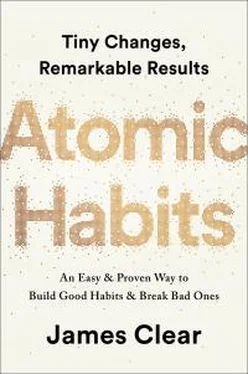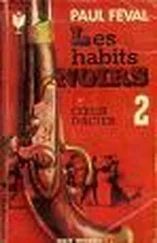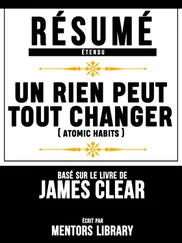The more deeply a thought or action is tied to your identity, the more difficult it is to change it. It can feel comfortable to believe what your culture believes (group identity) or to do what upholds your self-image (personal identity), even if it’s wrong. The biggest barrier to positive change at any level—individual, team, society—is identity conflict. Good habits can make rational sense, but if they conflict with your identity, you will fail to put them into action.
On any given day, you may struggle with your habits because you’re too busy or too tired or too overwhelmed or hundreds of other reasons. Over the long run, however, the real reason you fail to stick with habits is that your self-image gets in the way. This is why you can’t get too attached to one version of your identity. Progress requires unlearning. Becoming the best version of yourself requires you to continuously edit your beliefs, and to upgrade and expand your identity.
This brings us to an important question: If your beliefs and worldview play such an important role in your behavior, where do they come from in the first place? How, exactly, is your identity formed? And how can you emphasize new aspects of your identity that serve you and gradually erase the pieces that hinder you?
THE TWO-STEP PROCESS TO CHANGING YOUR IDENTITY
Your identity emerges out of your habits. You are not born with preset beliefs. Every belief, including those about yourself, is learned and conditioned through experience.*
More precisely, your habits are how you embody your identity. When you make your bed each day, you embody the identity of an organized person. When you write each day, you embody the identity of a creative person. When you train each day, you embody the identity of an athletic person.
The more you repeat a behavior, the more you reinforce the identity associated with that behavior. In fact, the word identity was originally derived from the Latin words essentitas , which means being, and identidem , which means repeatedly . Your identity is literally your “repeated beingness.”
Whatever your identity is right now, you only believe it because you have proof of it. If you go to church every Sunday for twenty years, you have evidence that you are religious. If you study biology for one hour every night, you have evidence that you are studious. If you go to the gym even when it’s snowing, you have evidence that you are committed to fitness. The more evidence you have for a belief, the more strongly you will believe it.
For most of my early life, I didn’t consider myself a writer. If you were to ask any of my high school teachers or college professors, they would tell you I was an average writer at best: certainly not a standout. When I began my writing career, I published a new article every Monday and Thursday for the first few years. As the evidence grew, so did my identity as a writer. I didn’t start out as a writer. I became one through my habits.
Of course, your habits are not the only actions that influence your identity, but by virtue of their frequency they are usually the most important ones. Each experience in life modifies your self-image, but it’s unlikely you would consider yourself a soccer player because you kicked a ball once or an artist because you scribbled a picture. As you repeat these actions, however, the evidence accumulates and your self-image begins to change. The effect of one-off experiences tends to fade away while the effect of habits gets reinforced with time, which means your habits contribute most of the evidence that shapes your identity. In this way, the process of building habits is actually the process of becoming yourself.
This is a gradual evolution. We do not change by snapping our fingers and deciding to be someone entirely new. We change bit by bit, day by day, habit by habit. We are continually undergoing microevolutions of the self.
Each habit is like a suggestion: “Hey, maybe this is who I am.” If you finish a book, then perhaps you are the type of person who likes reading. If you go to the gym, then perhaps you are the type of person who likes exercise. If you practice playing the guitar, perhaps you are the type of person who likes music.
Every action you take is a vote for the type of person you wish to become. No single instance will transform your beliefs, but as the votes build up, so does the evidence of your new identity. This is one reason why meaningful change does not require radical change. Small habits can make a meaningful difference by providing evidence of a new identity. And if a change is meaningful, it actually is big. That’s the paradox of making small improvements.
Putting this all together, you can see that habits are the path to changing your identity. The most practical way to change who you are is to change what you do.
Each time you write a page, you are a writer.
Each time you practice the violin, you are a musician.
Each time you start a workout, you are an athlete.
Each time you encourage your employees, you are a leader.
Each habit not only gets results but also teaches you something far more important: to trust yourself. You start to believe you can actually accomplish these things. When the votes mount up and the evidence begins to change, the story you tell yourself begins to change as well.
Of course, it works the opposite way, too. Every time you choose to perform a bad habit, it’s a vote for that identity. The good news is that you don’t need to be perfect. In any election, there are going to be votes for both sides. You don’t need a unanimous vote to win an election; you just need a majority. It doesn’t matter if you cast a few votes for a bad behavior or an unproductive habit. Your goal is simply to win the majority of the time.
New identities require new evidence. If you keep casting the same votes you’ve always cast, you’re going to get the same results you’ve always had. If nothing changes, nothing is going to change.
It is a simple two-step process:
Decide the type of person you want to be.
Prove it to yourself with small wins.
First, decide who you want to be. This holds at any level—as an individual, as a team, as a community, as a nation. What do you want to stand for? What are your principles and values? Who do you wish to become?
These are big questions, and many people aren’t sure where to begin—but they do know what kind of results they want: to get six-pack abs or to feel less anxious or to double their salary. That’s fine. Start there and work backward from the results you want to the type of person who could get those results. Ask yourself, “Who is the type of person that could get the outcome I want?” Who is the type of person that could lose forty pounds? Who is the type of person that could learn a new language? Who is the type of person that could run a successful start-up?
For example, “Who is the type of person who could write a book?” It’s probably someone who is consistent and reliable. Now your focus shifts from writing a book (outcome-based) to being the type of person who is consistent and reliable (identity-based).
This process can lead to beliefs like:
“I’m the kind of teacher who stands up for her students.”
“I’m the kind of doctor who gives each patient the time and empathy they need.”
“I’m the kind of manager who advocates for her employees.”
Once you have a handle on the type of person you want to be, you can begin taking small steps to reinforce your desired identity. I have a friend who lost over 100 pounds by asking herself, “What would a healthy person do?” All day long, she would use this question as a guide. Would a healthy person walk or take a cab? Would a healthy person order a burrito or a salad? She figured if she acted like a healthy person long enough, eventually she would become that person. She was right.
Читать дальше




![Джеймс Клир - Атомные привычки [Как приобрести хорошие привычки и избавиться от плохих]](/books/403243/dzhejms-klir-atomnye-privychki-kak-priobresti-horosh-thumb.webp)



